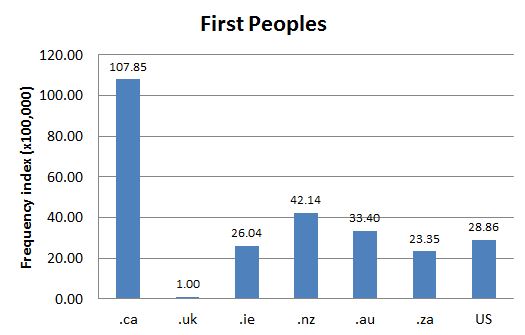DCHP-2
First Peoples (First People) first peoples, first people DCHP-2 (October 2016)
n. — plural, Ethnicities, also found in the singular First people
the Aboriginal peoples of Canada, which include the First Nations, Inuit, and Métis peoples.
Type: 5. Frequency — This term is Canadian by virtue of frequency. As shown in Chart 1, First Peoples is over twice as common in Canadian English as in the national variety with the second-highest counts, New Zealand English.
See also Gage-1, s.v. "First Peoples", which is described as "in Canada", ITP Nelson, s.v. "First Peoples", which is described as "in Canada", COD-2, which does not label the term.
